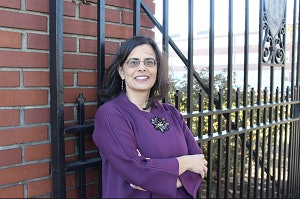“Where do you want the fake blue flowers?” Sarah, the honor society officer asks as she is hidden behind a giant fake blue hydrangea. “On the front tables near the microphone.” I tell her as I’m looking at my list of things to be done in the next hour before the Education honor society induction.
This is the night when parents will beam at their children, some of whom are the first in their families to go to college, as they receive their purple honor society cords. The past three months have been a blur of initiates’ community service projects, letters of recommendation streaming in, indecision between tiny meatballs or chicken sticks, RSVPs, rehearsals, and finally now it was all coming together in a room with 13 round white tableclothed tables that can fit 8 to 10 and snacks for 100.
 Dr. Pam Hollander
Dr. Pam HollanderIt may be easier to be a guest than the planner of an event, but I seem to be drawn to plan them over and over. My career as professor has been dominated by developing and organizing scholarship award ceremonies, concerts, speakers, honor society initiations, student club meetings and colleague gatherings. I seem to be drawn to programming for people — to throw them together, to have them experience something new together, to create a memorable night for them.
Although, now I can throw an honor society induction ceremony with a blindfold on, it wasn’t always like that. In college I was in charge of organizing a Take Back the Night March for the Women’s Center, and although I got all the speakers lined up and to show up, I somehow took the directions “Tell the men to stand behind us” too literally and actually got up to the mic and insisted that men can march, but they will have to wait for us to go first. It was embarrassing for me to live through the mistake and to have it written up in the newspaper as well.
Then there was the scholarship award ceremony for the English Department during my first year as a professor when two weeks before the ceremony I realized, and my Chair realized too, that I had forgotten to invite the most important guests — the scholarship donors!
I got better at prioritizing and thinking ahead, and my events ran more smoothly, although food is the hardest thing to predict. Will you have 200 tiny meatballs staring at you at the end of an event, or empty trays after 15 minutes of an hour long event? It can be hard to say.
If organizing events may seem like extra work, work that may not “count” much toward tenure at some institutions, it shouldn’t be seen like that. Research tells us that these gatherings improve our students’ chances of success, deepen their connection to what Tetrizini et al. call the “fabric” of a college environment. They also make faculty and staff feel more job satisfaction, as they feel valued and connected. The opportunity to learn about a new topic while working adds to one’s job satisfaction.
Campus events overlap with several of George Kuh’s High Impact practices for college students, providing shared experiences for students and offering them the chance to encounter a diverse variety of cultural experiences, including ones that reflect their own cultural background. I’ll never forget how when I was teaching a class on hip hop culture and was able to bring hip hop scholar-artists to campus, an African-American student who attended said it was the best presentation he had attended all year. He made it clear that it was the first presentation he had gone to that he connected with culturally.
Planning an event for students or faculty already counts as service, but I would ask department chairs and deans to set the tone for elevating this work within that category. Departments and campus communities benefit in so many ways from this work, which often goes largely underappreciated. The variety of skills the event planner draws on and the lasting community building accomplished through an event makes it well worth it to value this contribution highly. Many faculty like me, would like to do this work no matter what, recognized or not, but elevated status would ensure faculty get proper credit toward tenure for all of their effort.
My father was a program director for a Y community center, so perhaps I couldn’t help becoming a “programmer,” but now I see all of the benefits of such endeavors for academia. They are a lot of work, but when we and are students are having that shared experience of bonding and learning, it is worth it.
Dr. Pam Hollander is an associate professor in the Department of Education at Worcester State University.















